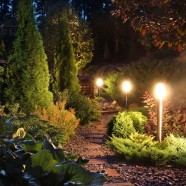
Your landscape lighting adds value to your home or business, so keeping it functioning is an important part of your regular building maintenance. Electrical maintenance can be as simple as visually inspecting the property each week to make sure everything is working, or as thorough as hiring an electrical contractor to to regular maintenance tasks. There is no single cause for landscape lighting failure; the causes are varied, with some preventable and some out of your hands.
Timer Issues
While the timer itself isn’t part of the lighting system outside, it’s a crucial part of the equation. Without the timer, the even the most perfect lights just won’t work. Faulty timers can cause lights to go on and off at the wrong time, or not to go on at all. Your electrical contractor can determine what the problem is, and can reset or repair the timer if possible, and replace it if it can’t be repaired.
Physical Damage
Landscape lighting, by definition, is mainly placed on the ground. Unfortunately, so are lawnmowers, delivery trucks, weed trimmers, and other mechanical means of damaging your lighting system. Physical damage can be as simple as a broken light bulb from careless landscape crews to chewed up wiring from the local squirrel population. Your contractor will detect and diagnose these problems during regular electrical maintenance inspections, and can repair or replace parts as needed.
Wiring
Perhaps the most difficult landscape lighting problems to diagnose are those related to wiring. Much like wiring in a home or commercial building, breaks or damage can occur in spots with difficult access. Buried wiring that connects a series of walkway or flower bed lighting may be out of the way of errant weed trimmers, but it’s fair game for mice and squirrels who then usually bury their misdeeds.
In addition, wiring gets old and breaks in any system, especially those exposed to the extreme weather that’s the norm in southern Florida. Regular maintenance can find these problems before they get worse, making electrical repairs while moving the wiring or devising systems to protect it from further damage.
Weather
Here in the southernmost part of Florida, the weather can be extreme and difficult on physical parts of a landscape lighting system. Among the frequent culprits for damaged lighting are:
- Lightning strikes: We have more lightning strikes per square mile than any other state in the country.
- Power surges: Locals know blackouts and power surges are a fact of life to be dealt with, but they can burn out electrical systems.
- Tropical storms and hurricanes: The sheer amount of water connected with these storms is enough to wash away some landscape lighting systems. While not a large concern in the grand scheme of things, it’s still something to consider when listing items for insurance.
- Heat: Southern Florida is nothing if not hot for most of the year. 100+ degree days are not unusual through much of the summer, and sunshine and warmth are the norm throughout most of the year. While this makes our area a tropical vacation paradise, it also will break down plastics and vinyls that make up much of a modern landscape lighting system. This shortens their lifespan, and can mean replacement instead of repair is the better option.
Birds
Our area is known as a paradise for birders, with the large and varied flocks of all sizes that make southern Florida their home. Unfortunately, lights on poles seem to make attractive spots for birds to perch on and nest. While this isn’t usually a problem, there are times when bird droppings corrode electrical fixtures or nest materials get into a light that’s not properly sealed. Something as small as a bird’s nest can sometimes take out the entire lighting system for a business parking lot. Regular maintenance to remove nest materials can help prevent these problems, as well as anti-bird spikes or poles you can affix to the lights themselves.

Recent Comments